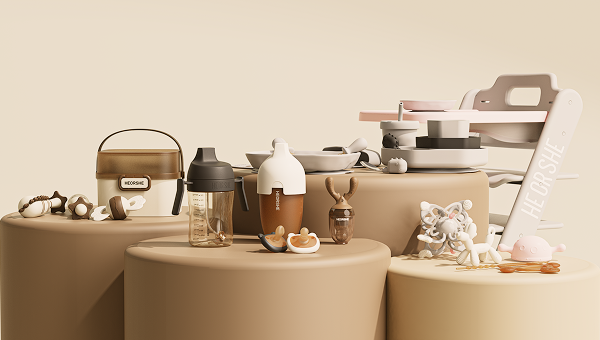Introducing your baby to the world of self-feeding is a significant milestone in their growth and development. As your little one moves from being spoon-fed to exploring the joy of using forks and spoons, selecting the right utensils becomes essential. The right forks and spoons can not only aid in the development of motor skills but also promote independence, build positive mealtime habits, and enhance the overall feeding experience.
In this comprehensive guide, we will explore how to choose forks and spoons for babies, the importance of fork spoon sets, the role of small spoons in baby feeding, and tips to make mealtime more enjoyable for your baby.
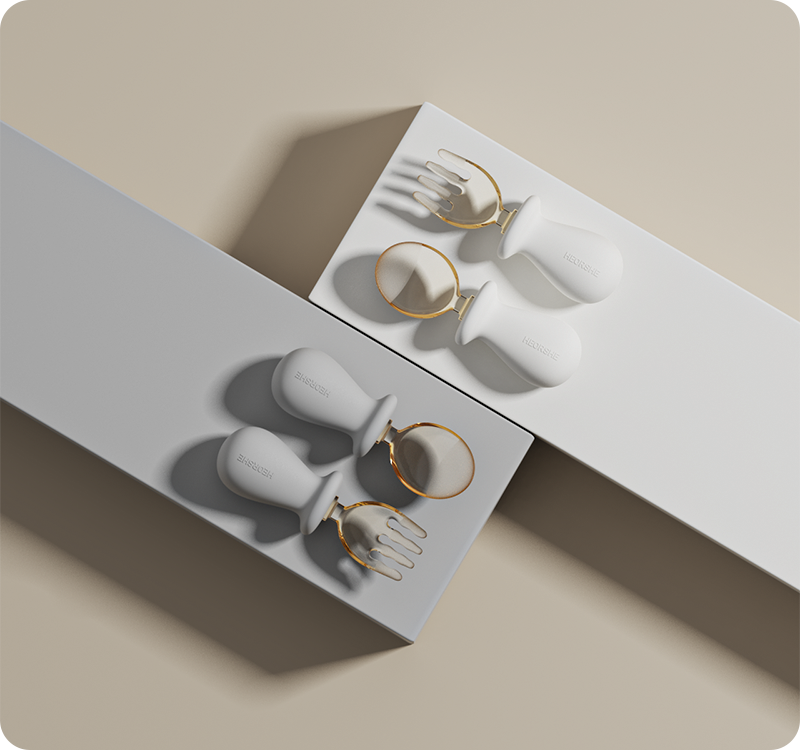
The Importance of Choosing the Right Forks and Spoons for Babies
When your baby begins their journey into self-feeding, forks and spoons become vital tools that encourage both exploration and independence. But with so many options available, it can be overwhelming to know what features are most important. Here’s why the right utensils matter:
1. Safety First: Protecting Your Baby’s Delicate Mouth
The safety of your baby should always be your number one concern when choosing forks and spoons. Babies have soft, sensitive gums, and their teeth are still emerging. Choosing the right utensils can help prevent accidental injuries while allowing your baby to practice feeding themselves.
- Material: The material of the utensils is crucial. You’ll want to ensure that the forks and spoons are made from non-toxic, BPA-free materials. BPA (Bisphenol A) is a chemical found in plastics that has been linked to health issues, so it’s essential to choose utensils that are free from this harmful substance. Stainless steel, silicone, and food-safe plastic are the best choices for baby utensils as they are both durable and safe for babies.
- Rounded Edges: Another key safety consideration is the shape of the utensil. Avoid forks with sharp prongs or spoons with jagged edges, as these could hurt your baby’s gums. Instead, look for utensils that feature rounded edges. This helps to reduce the risk of injury as your baby learns to feed themselves.
- Non-Toxic Coatings: Be mindful of any paint or coatings used on the utensils. Babies tend to put everything in their mouths, so you want to ensure that the utensils are free from harmful chemicals like lead, phthalates, or toxic paints. Choose utensils that are either uncoated or coated with food-safe, non-toxic substances.
2. Size and Grip: Ensuring Comfort and Ease of Use
The size of the utensils is critical in helping your baby learn how to self-feed. If the utensils are too large or heavy, they can make feeding frustrating and difficult. Conversely, if they are too small, they might not hold enough food to be effective.
- Small Spoons: Small spoons are ideal for babies just starting to eat solid foods. The size of the spoon should be appropriate for your baby’s mouth and hand coordination. Small spoons allow your baby to scoop food without overloading their mouth, making it easier for them to manage their portions. These spoons are often shallow, allowing your baby to take smaller bites and control the amount of food they pick up.
- Ergonomic Handles: Babies are still developing fine motor skills, so it’s important to select forks and spoons that have handles designed for easy gripping. Many baby utensils come with ergonomic handles that are shaped to fit comfortably in your baby’s tiny hands. The handles should be long enough for your baby to hold onto, but not too long that they become cumbersome to use. Non-slip handles are also a great feature as they provide extra grip, ensuring that the utensils won’t slip out of your baby’s hands mid-meal.
- Lightweight: A heavy fork or spoon can be difficult for your baby to manage, leading to frustration. Lightweight utensils are essential because they allow your baby to control the spoon or fork more easily. Heavier utensils can also tire your baby’s hands out quickly, causing them to lose interest in feeding themselves.
3. Design and Color: Making Mealtime Fun and Engaging
The design and color of the utensils you choose can significantly impact your baby’s experience with self-feeding. Babies are naturally attracted to bright colors and fun designs, and these can make mealtime more exciting and engaging for them.
- Fun Designs: Baby utensils are often available in a wide variety of designs that can capture your baby’s attention. Some sets come with playful characters, animal shapes, or cartoon-themed handles that make feeding time more enjoyable. Fun designs not only help engage your baby but also encourage them to use the utensils more frequently.
- Bright Colors: Babies respond to bright, vibrant colors. Choosing forks and spoons in bright hues such as yellow, red, or blue can stimulate your baby’s senses and make mealtime feel like an exciting event. Brightly colored utensils are also easier to locate, which can be helpful if they tend to get dropped or misplaced during meals.
4. Age-Appropriate Features: Matching Utensils to Your Baby’s Developmental Stage
Babies develop rapidly, and the utensils they use should reflect their developmental milestones. As your baby grows, their ability to handle more complex utensils increases. Selecting age-appropriate utensils will ensure that your baby has the right tools to develop their feeding skills.
- Baby Fork Spoon Set: A fork spoon set designed specifically for babies is an excellent choice for parents looking to introduce both utensils at the same time. These sets usually come with a spoon that is perfect for scooping soft foods like purees or yogurt, as well as a fork with rounded prongs designed to help babies practice poking soft foods. Using both types of utensils together encourages your baby to practice different feeding techniques.
- Transition Utensils: As your baby becomes more proficient at self-feeding, you may want to consider transitioning to utensils with firmer tips. At this stage, your baby might be ready to try more solid foods like small pieces of fruit or vegetables. Forks with slightly longer prongs and spoons with deeper bowls will allow your baby to handle more complex foods and gain more control over their eating experience.
5. Ease of Cleaning: Making Mealtime Less Stressful for Parents
Since babies tend to make a mess while eating, cleaning the utensils afterward is just as important as selecting them. Choosing forks and spoons that are easy to clean will save you time and effort during and after mealtime.
- Dishwasher-Safe: Look for utensils that are labeled as dishwasher-safe. This feature is a time-saver, especially for busy parents. Baby utensils can get dirty quickly, so having a set that is easy to toss into the dishwasher ensures that you won’t spend too much time cleaning up.
- Smooth Surfaces: Some baby utensils have smooth, non-porous surfaces that prevent food from getting stuck in hard-to-reach areas. This makes cleaning easier and ensures that your utensils are free from bacteria buildup.
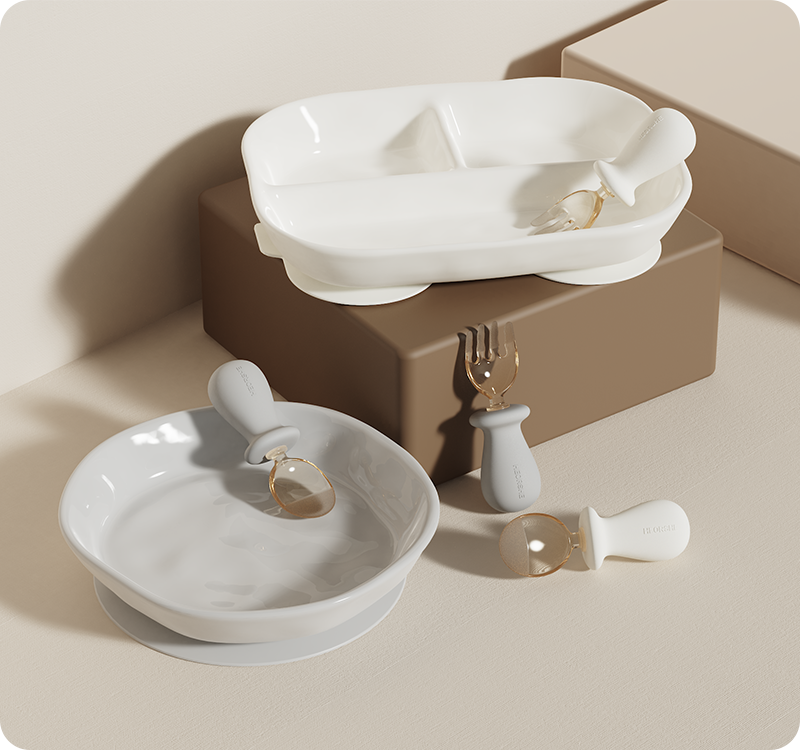
Choosing Between Forks and Spoons: What’s the Difference?
Both forks and spoons play an essential role in your baby’s feeding journey. Each utensil has its own purpose, and understanding when and how to use them can make a big difference in your baby’s self-feeding experience.
Forks for Babies
Forks are an important tool for babies as they begin to explore different textures and types of food. Forks allow your baby to practice fine motor skills by picking up pieces of food, especially those that can be pierced, such as pasta, vegetables, and fruit.
- When to Use: Forks are ideal for babies who are ready to eat more solid foods and are learning how to pierce or pick up food independently. Soft foods like small pieces of cooked vegetables or fruit slices are great for practicing with a fork.
- Fork Spoon Set: Some baby utensils come in a fork spoon set that allows your baby to practice both scooping with the spoon and piercing with the fork. This combination of utensils encourages a range of motor skills, such as hand-eye coordination, precision, and dexterity.
Spoons for Babies
Spoons are often the first utensil that babies use. They are essential for scooping and feeding, especially when babies are still eating purees or softer foods. Baby spoons are designed to be small and shallow, which helps prevent overloading and makes it easier for babies to take small bites.
- When to Use: Spoons are perfect for babies who are still eating soft foods like purees, oatmeal, or mashed vegetables. The shallow bowl allows your baby to scoop just the right amount of food and practice self-feeding.
- Small Spoons: Small spoons are essential for babies just starting their feeding journey. The smaller size ensures that your baby doesn’t take too much food at once, making mealtime more manageable and less messy.
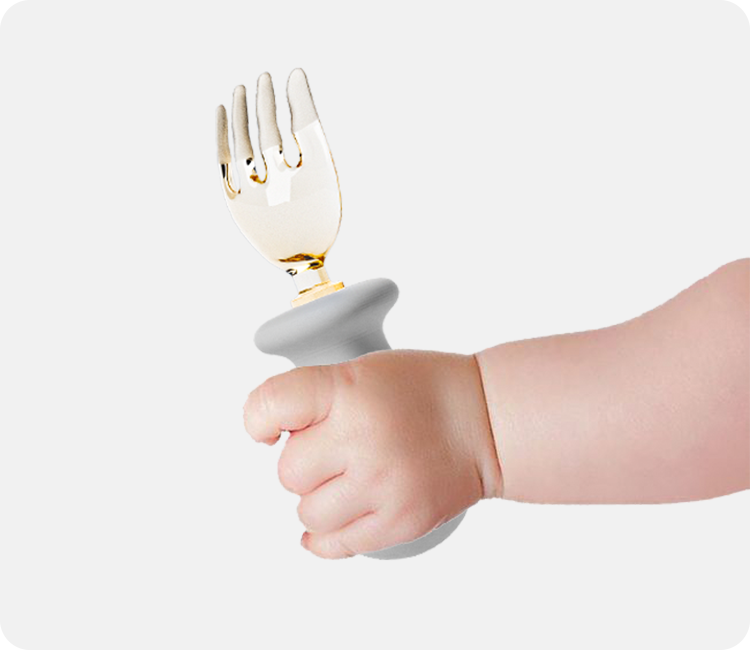
Tips for Introducing Forks and Spoons to Your Baby
Introducing forks and spoons to your baby can be a fun and rewarding experience. Here are some tips to help make the transition smoother:
1. Start Slow and Be Patient
Transitioning to self-feeding is a gradual process. Your baby might not master the use of forks and spoons immediately, and that’s okay. Start by letting them explore the utensils and practice using them on their own terms. Gradually increase the complexity of the foods they eat, and be patient as they learn how to feed themselves.
2. Model Proper Use
Babies learn best by watching others, so take the time to model how to use the fork or spoon during mealtime. Show them how to scoop food with the spoon or pierce it with the fork. Encourage them to mimic your actions, and offer praise when they try using the utensils on their own.
3. Make Mealtime Fun
Introduce fun and exciting foods that are easy to eat with forks and spoons. Foods like soft pasta, fruit slices, and scrambled eggs are great for babies to practice their feeding skills. The more enjoyable the experience, the more likely your baby will be to continue using their utensils.
4. Encourage Independence
As tempting as it may be to feed your baby yourself, giving them the opportunity to feed themselves fosters independence and builds confidence. Encourage your baby to use their fork spoon set, even if they make a mess. With practice, they will get better at self-feeding and develop important motor skills.
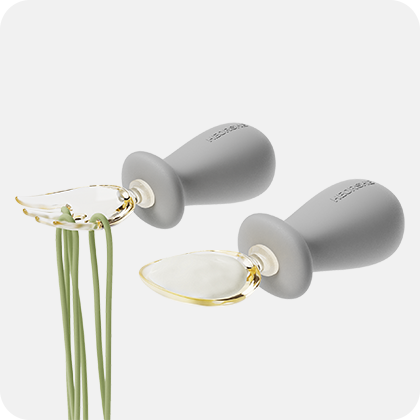
Conclusion: Choosing the Best Forks and Spoons for Your Baby
Choosing the right forks and spoons for your baby is essential for promoting self-feeding, developing motor skills, and ensuring a positive mealtime experience. Whether you choose a fork spoon set, small spoons, or a combination of both, make sure the utensils are safe, comfortable, and developmentally appropriate for your baby.
By considering factors such as material, size, grip, design, and ease of cleaning, you can select the perfect utensils to support your baby’s journey to self-feeding. With patience, encouragement, and the right tools, your baby will soon be feeding themselves independently with forks and spoons, marking an exciting step in their growth and development.

